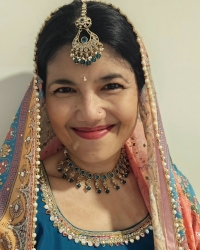Tamil (Hindu traditions) in Fiji

Photo Source:
Anonymous
|
Send Joshua Project a map of this people group.
|
| People Name: | Tamil (Hindu traditions) |
| Country: | Fiji |
| 10/40 Window: | No |
| Population: | 80,000 |
| World Population: | 3,640,000 |
| Primary Language: | Tamil |
| Primary Religion: | Hinduism |
| Christian Adherents: | 22.00 % |
| Evangelicals: | 10.00 % |
| Scripture: | Complete Bible |
| Ministry Resources: | Yes |
| Jesus Film: | Yes |
| Audio Recordings: | Yes |
| People Cluster: | South Asia Hindu - other |
| Affinity Bloc: | South Asian Peoples |
| Progress Level: |
|
Introduction / History
The homeland of the Tamil people is southeast India. Tamil is one of the major languages of India and the 17th most spoken language in the world. Tamils are proud of their cultural and literary heritage that dates back over 2000 years. Before the coming of the Europeans, at various times Tamils ruled an empire in south India and Southeast Asia. Many thousands of Tamils have left South India and live in dozens of countries throughout the world. Some migrated to the Pacific island nation of Fiji. The Tamils often came as indentured servants and laborers. The ability of the Tamils to speak English gave them an advantage in Fiji and in international business. A small fraction of Tamils of Hindu background in Fiji has become followers of Jesus Christ. Fiji is a group of 300 islands around 1300 miles northeast of New Zealand. About 110 of the islands are inhabited. In 1874 the British established the Colony of Fiji. In 1987 a military government declared Fiji as a republic. Nearly 40% of the islands' population are classified are Indo-Fijians, descendants of indentured servants brought to Fiji by the British in the late 19th and early 20th centuries.
What Are Their Lives Like?
The main sources of income on Fuji are tourism, fishing, logging, sugarcane, offshore oil and minerals. Deposits of gold and copper are found on the islands. Tamils are involved in all the different industries of Fuji but especially tourism and banking. The ability of the Tamils to read and write fluent English aids them in business and trade. Tamils also have a higher level of education than the average Fijian citizen. Tamils hold some of the most prestigious positions in Fijian society in medicine, universities, business, law, and finance. Tamil parents encourage their children to get university degrees. The father is the head of the Tamil family. He shares leadership with his wife over the children. A woman has a higher place in the Tamil home than in most Asian cultures. Tamils in Fiji try to maintain their ethnic identity and at the same time become model Fijian citizens. In traditional Tamil culture, the parents chose the spouse of their children. This practice has changed in Western societies where children frequently choose their partner with their parents' guidance. Tamil parents strongly encourage their children to marry within their culture, religion, and caste.
What Are Their Beliefs?
The majority of Tamils living in Fiji practice Hinduism, the ancient religion of India. The patron god of the Tamils is Murugan, the Hindu god of war. Hindus worship and serve the gods of the Hindu pantheon. Hindus believe that by performing rituals and good works that they will attain moksha or freedom from the endless cycle of birth, death and rebirth. The Tamils visit Hindu temples and offer prayers, food, flowers, and incense to their gods in hopes of gaining protection and benefits. They do not have a personal or familial relationship with their gods as Christians do with their heavenly Father. There are many forms of Hinduism, each with its own deities and beliefs. The main yearly holidays of the Hindu Tamil people are Holi, the festival of colors and the start of spring, Diwali, the festival of lights, Navratri, the celebration of autumn and Rama Navami, Rama's birthday. Fijian Tamils also frequently celebrate Christian holidays. The Tamil New Year is celebrated on April 14.
What Are Their Needs?
The Tamils in Fiji need to understand that material success will not bring them the happiness they are seeking. Jesus Christ is much more than a Hindu god or guru. Only through Christ can a Tamil or any person receive the forgiveness of his or her sins and the gift of eternal life.
Prayer Points
Pray the Lord raises up a Disciple Making Movement among the Tamils in Fiji in this decade. Pray the Lord moves Fijian believers and churches to reach out and share the good news with the Tamils. Ask God to bring Tamil leaders and heads of families into His kingdom.